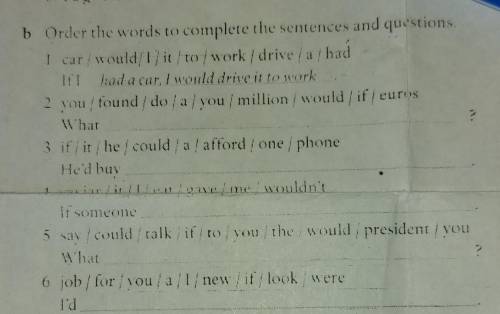6. I'd go for a walk b Order the words to complete the sentences and questions
1 car would: 1) it to work drive a had
I had a car. I would drive it to work
? you found/do/a/you/ million would / if euros
What
3 if it he could a afford / one iphone
He'd buy
for lille time wouldn't
If someone
5 say I could talk if to you the would president you
What
6 job for you all new it look were
Id

Другие вопросы по теме Английский язык
Популярные вопросы
- Дана функция y=√x a)График функции проходит через точку (а;9). Найдите...
2 - Устаревшее словоа. барыняб. учебникв. портфельг. аким...
3 - Задана функция y=\|x. Определите, принадлежит ли точка А(-3; 9) графику...
2 - Тастан жасалган алыпка караган адамнын зәресін үшырган...
1 - 3. В военное время джунгары могли выставить армию численностью в. А)...
3 - Read and match the halves to make correct sentences....
3 - Перевести 20м в сантиметров...
2 - при пересечении двух прямых образовались углы если один из них равен 120...
1 - Сделайте _Лучше на бумаге напишите,и отправте_...
3 - Зерттеудің мақсаты деп нені айтамыз?...
3
Explanation: The sentence is in the second conditional form, which expresses a hypothetical or unreal situation in the present or future. The word "if" introduces the condition (having a car), and the verb "would" shows the result (driving it to work). This implies that the speaker currently does not have a car but imagines what they would do if they did.
2. What would you do if you found a million euros?
Explanation: The word order in this question needs to be rearranged. The correct order is: "What would you do if you found a million euros?" The question is also in the second conditional form, asking about a hypothetical situation. The word "if" introduces the condition (finding a million euros), and the verb "would" asks about the action someone would take in that situation.
3. He'd buy an iPhone if he could afford one.
Explanation: This sentence is also in the second conditional form. The contraction "He'd" represents "He would," and the word "if" introduces the condition (being able to afford an iPhone). The verb "could" shows the ability or possibility, and the verb "buy" states the action he would take if the condition were met.
4. If someone said I could talk to the president, what would you say?
Explanation: The word order in this question needs to be rearranged. The correct order is: "What would you say if someone said I could talk to the president?" The sentence still remains in the second conditional form, asking about a hypothetical situation. The word "if" introduces the condition (someone saying the speaker could talk to the president), and the verb "would" asks about the response or reaction to that situation.
5. If you were the president, what would you do?
Explanation: This sentence is in the second conditional form, describing a hypothetical situation where the person is the president. The word "if" introduces the condition (being the president), and the verb "were" is the past subjunctive form of "to be," used in this case to express an unreal or hypothetical situation. The verb "would" asks about the actions or decisions someone would make if they were in that position.
6. I'd look for a new job if I were you.
Explanation: This sentence is in the second conditional form, giving advice or a suggestion. The contraction "I'd" represents "I would," and the phrase "if I were you" is a common expression used when offering advice or a recommendation to someone. The verb "look" suggests searching or seeking, and the noun phrase "a new job" specifies what the person would search for.